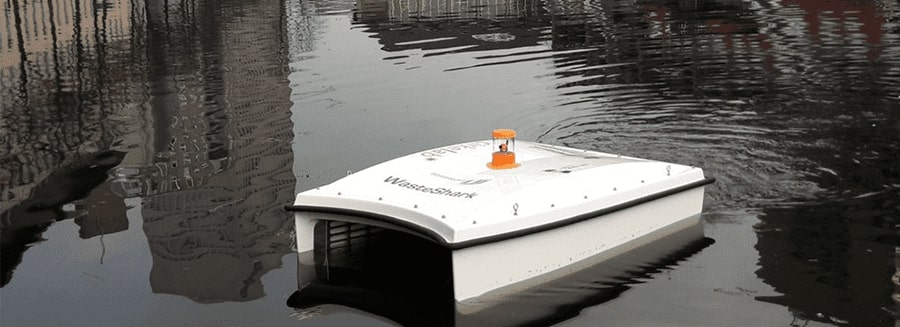Intended to provide an international showcase for innovative start-ups with eco-friendly / green yachting product ideas, Nautical High Tech & Green is a platform established by French ecopreneur Sophie Mordelet.
At last year’s METSTRADE Show, Sophie hosted a shared stand which gave several small companies the opportunity to show their wares. One of these was the Waste Shark, a concept created by South African, Richard Hardiman, and marketed through his Rotterdam based company RanMarine Technology.
Richard was already sounding confident about the future of his invention when we spoke with him on the stand. His ideas were Inspired by the Whale Shark, one of nature’s most efficient harvesters of marine biomass, and his product development was supported by PortXL, a Maritime Accelerator for start-ups in the Port of Rotterdam, one of the world’s busiest commercial harbours.
The Shark in action
The Waste Shark is designed for round-the-clock waste collection, swimming through enclosed waters under remote control, where it can also scan and monitor the condition of the marine environment, sending data on water conditions back to a central command point. The Waste Shark has a carrying capacity of up to 160 kg, a battery life of 8 hours, and weighs just 39 kg unladen. The “sharks mouth’ gobbles up plastics, micro-plastics, alien vegetation (e.g. duckweed etc.), and all types of floating debris at rates up to 1 kg per minute, then returns it to shore for disposal.;
With units already successfully operating in Dubai and South Africa as well as in the Netherlands, another milestone was reached in March this year. The Sky Ocean Rescue and WWF collaborated, to launch the first Waste Shark to be deployed in the UK. In operation for five days a week, the Shark is expected to recover up to 15 tons of floating debris a year, from the waters of Ilfracombe harbour in North Devon.
Sky Ocean Rescue was formed in 2017 by the well-known Sky TV/Media conglomerate, and following the ‘Our Oceans Conference’ that year, they have partnered with the World Wildlife Fund, (WWF) aiming to safeguard some 400,000 km2 of Marine Protected Areas across Europe's oceans, with a financial commitment of £ 25 million over five years.
Ilfracombe is the largest harbour on the North Devon coast and has been in existence as a port for several centuries, these days it receives about 600 leisure yachts every summer. In 2018, the port authority published a comprehensive environmental management plan committed to complying with all relevant National, European and International Environmental Legislation for both land and sea.
Advanced intelligent solutions
The EU has been taking an active interest in the Waste Shark, after estimating that marine litter costs the European economy € 690 million per year, affecting mainly the tourism and fishery sectors. With some support from the EU Commission, RanMarine has upgraded their concept to make autonomous aquadrones available which can work together in self organising clusters. This operational concept can provide a data-driven, complete waste capture and delivery solution, based on advanced robotics.
So now the aquadrones are able to work collectively in groups, as well as individual units, and some clever programming enables them to share knowledge, with decisions made based on acquired data. For example, if one drone is quickly filling up, it can be assumed that the location has high waste density, resulting in the deployment of additional drones.
Following these developments, RanMarine is now selling WasteSharks in two formats. Class A is a remote-controlled unit driven by a land-based operator and used solely to collect and remove biomass. Class B is a data and sensor-enabled unit with mission planning ability, whereby the aquadrones can course-set or manage a particular area for autonomous cleaning.
Note: Nautical High Tech & Green have already booked space for METSTRADE 2019, so look out for more environmentally friendly concepts being represented on their stand.

